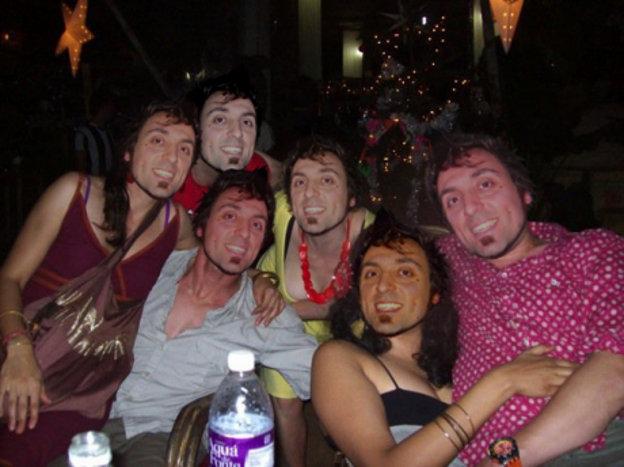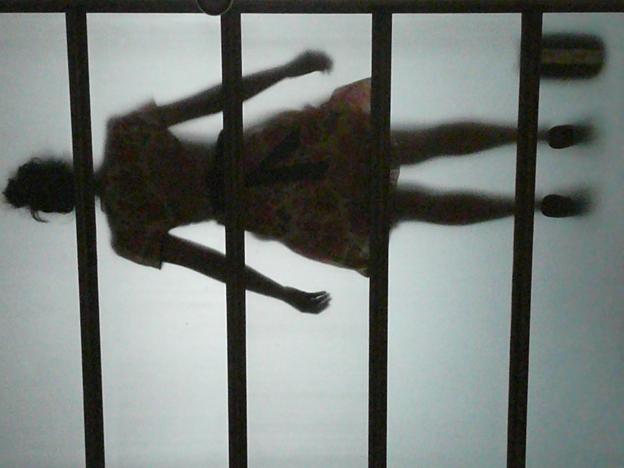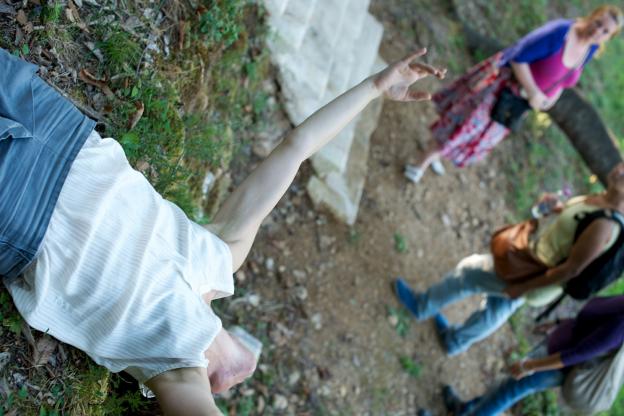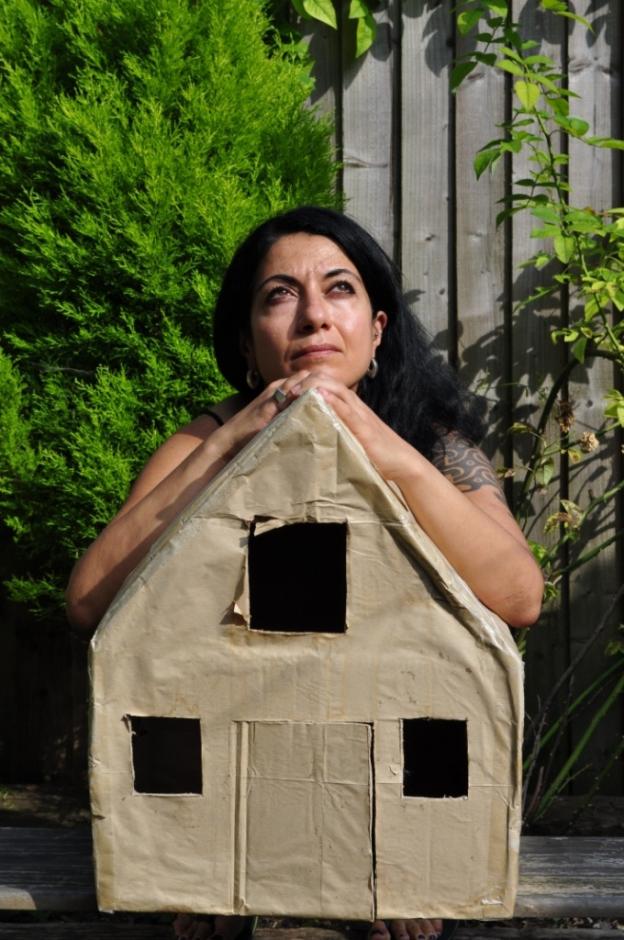‘Hello my name is Richard DeDomenici. People often ask me what motivates me as an artist. I often say something like: I want to create the kind of uncertainty that leads to possibility…’
So, here we are – The Basement on a Friday afternoon, embracing uncertainty and possibility: it’s a sunny day but we are underground in the almost-dark, gathered in the cool (in both senses of the word) main space of ‘Brighton’s buzzy home for avant-garde theatre’ as the venue was dubbed by the Independent’s Alice Jones.
We have the pleasure of Richard’s company and guidance for a Quickfire workshop – Quickfire being The Basement’s latest wheeze, a series of one-day workshops with an established artist which leads to a performance the next day at Supper Club, a once-a-month platform for live art and experimental performance.
The group stand in a circle a little warily, the ice not yet broken. It’s most definitely a mixed bunch: the youngest of the group is an 18 year-old who has just left school, on a gap year; at the other end of the age-and-experience spectrum is a 50-something actor with a wealth of experience on stage and TV and a producer of cabaret events. There’s a Laban-trained dancer with a strong interest in live art, a University of Chichester Ensemble Theatre graduate, a would-be stand-up comedian, and a student on the legendary Visual and Performing Arts course at Brighton University (the course that spawned Robert Pacitti and Marisa Carnesky amongst many other feted alumni). I’m there as a fly-on-the-wall, but I soon get drawn into the game…
After the usual name exchanges, we are given a five-minute intro to Richard DeDomenici’s work, onscreen and live – in effect, an extract from his latest show, Popaganda (which was also referenced at Supper Club the following night, and which I got to see in full when it was presented at The Basement in the week after the Supper Club appearance).
One of the characteristics of Richard’s practice is that he often cannibalises his own stuff – one project getting referenced within another in a kind continuously building body of work that incorporates all that has gone before. We could see his life as an artist as one great big ongoing game of Blob. Thus, previous projects such as his Unattended Baggage intervention (in which a seemingly abandoned suitcase is left in key sites in city centres; when approached, the suitcase grows legs and scuttles off), and his legendary walk down a Chicago street with head hooded in a plastic bag and hands tied behind his back, both find their way onscreen into the new show.
He notes (in his Quickfire workshop, at Supper Club and in Popaganda – so obviously an idea he is fond of!) that he has ‘shamanistically’ managed to pre-empt major world events, citing for example that the Abu Ghraib prisoner torture and abuse scandal broke just weeks after the Chicago performance work was enacted; and ominously his Attempt to Earthquake-Proof Tokyo, which featured the installation of bobbly strap-hangers in all sorts of random places, was enacted in Japan not long before the devastating earthquake of 2011.
Not only has it become a given that Richard’s shows will keep you in the loop about his previous works, but also that revisiting past works sometimes becomes a new aspect of the current work. But what with Abu Ghraib and the Japan earthquake – not to mention the unfortunate murdered-spy-in-the-suitcase scandal that has made him feel a bit uncomfortable about Unattended Baggage – there are some actions that it is getting hard to consider revisiting. He does, however, get to ‘check out the Checkpoint Charlie Museum’ in Berlin to see what happened to the Looking for Freedom exhibit he ‘covertly installed’ (well, stuck on the wall in plain view of anyone who might be watching, actually!) three years earlier. Apparently, David Hasselhof (I don’t watch TV and sometimes have embarrassing gaps in my popular culture references – he is apparently a pop singer who had a hit with Looking for Freedom, an anthem filmed on the Berlin Wall) had given an interview to a German magazine saying he found it ‘a bit sad that there is no photo of me hanging on the walls of the Checkpoint Charlie Museum’ and – well, Richard to the rescue. And yes, you’ve guessed, three years on Looking for Looking for Freedom reveals that it is still there where Richard stuck it – either because it hasn’t yet been detected, or because the museum are grateful to Richard for providing a necessary exhibit that they’d crucially overlooked.
The blurb on Popaganda on the Arts Admin website describes Richard as ‘a jetlagged litterpicker of the world’s cultural landfill’. He certainly does get around, but it’s not all exotic hotspots – he is often to be found in his hometown, Watford, or its arch-rival Croydon (a rivalry probably invented and most definitely nurtured by DeDomenici). There’s a lot about Croydon in Popaganda – the Destroydon project at the sadly now-closed Croydon Clocktower; and a very funny reflection on the use of Croydon as a film location stand-in for Manhattan, and how that notion can be subverted by making films about Croydon in New York.
Humour in general, and satire in particular, are paramount in his work. The humour verges from the downright silly (Swivelympics on office chairs, anyone?) to the ludicrously funny and daring – none more so than in his other Olympics-related project, DeDomenici Torch 2012 in which he toured the country running ahead of the official torch-bearers appropriately-attired and bearing a convincing-looking fake torch (the real ones are pretty fake looking, so they aren’t too hard to fake). One of the craziest aspects of this project was that even when people realised he was ‘fake’, because he looked like a real torch-bearer they wanted their photos taken with him. An interesting reflection on make-believe versus real-life that goes right to the heart of performance-making…
Which brings us back to the Quickfire participants and Richard’s workshop. As someone who most often makes work in public spaces rather than on stages, how was he going to approach leading a workshop that aimed to create three-minute staged performances? The answer to that was a well-held workshop that used a variety of techniques to give participants the opportunity to develop whatever forms of work they were happy with. Some Augusto Boal (via Larry Bogart) physical exercises; a creative writing section that moved from free-writing to sharing in pairs, to re-tellings to the whole group (raising all sorts of interesting questions about truth and fiction, owning the story, and the ethics of a storyteller’s poetic licence with someone else’s personal material); and later (after I had sadly had to leave the group to it) an outing to Brighton’s Poundshops (or 99p shops for those keen to budget their resources) to find the one object that would best serve as the vehicle for the storytelling when staged.
It was interesting arriving at Supper Club to witness the resulting three-minute Quickfire works, stories I’d heard in a raw state earlier now transformed into a series of performance pieces all loosely worked around the theme of ‘relationships’, using many and various forms and techniques.
Some were pretty close to the original pieces of writing – a story about a childhood den inside a wardrobe is retold sitting cross-legged on the floor, a hand-held torch lighting up the actor’s face. Others had undergone a radical process – a tale of shame at a boys’ football club becomes a carefully honed and cleverly choreographed series of physical actions and whittled-down words with a plastic football as a prop. One performer, with a story about her childhood hideaway shed being destroyed by her parents when she went off travelling, had obviously been encouraged to let out the anger she’d suppressed all these years – but found a way to do so that balanced outrage and humour, her parents’ cheery emails and photos documenting the destruction of the shed passed round the audience, with the mini-performance culminating in a plastic toy battered to pieces in a symbolic release of frustration. Of course these performances were raw, and of varying quality – but what Quickfire was offering was the chance to feel the fear and do it anyway. Whether you’re just starting out, or have 30 years experience, it takes guts to make a piece of work from scratch in just one afternoon, then show it the next day to a ‘real’ audience.
Richard DeDomenici was perhaps the perfect choice for the first outing of this new initiative – so much of his own work is about having the bravery to just do it, regardless of the outcome. And this bravado coupled with his trademark humour encourages a ‘whatever happens it’s all good’ attitude to audiences both of his own work and of anyone he is supporting or mentoring.
It’ll be interesting to see how the Quickfire series plays out over coming months, with sessions by Victoria Melody (Friday 2 November for Supper Club on Saturday 3 November) and Ivan Fabrega (30 November / 1 December) lined up.
For more on Quickfire and The Basement programme see here. For Popaganda tour dates see the Arts Admin website. For more on Richard DeDomenici’s work see his website and YouTube.








